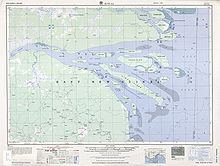Kiwai (people)

The Kiwai are an ethnic group that live primarily on the largest inland island of the same name in the Fly river delta , on Kiwai , in Papua New Guinea ( Gulf of Papua ). They colonize a few other islands and various coastal villages on the mainland.
The Kiwai live in sometimes very large longhouses ( moto ). The Finnish ethnologist Gunnar Landtman describes in the notes he made during his stay from 1910 to 1912 that there was even a long house 154 meters in length in Oromosapua. In addition, the men of the people have their own men's houses ( dárimo ), which they use for ritual purposes, earlier in preparation for military campaigns. In the village communities there was equal status among men, unless times of crisis made temporary leadership of individuals ( big men ) necessary. The women play a subordinate role and are not allowed to be present on numerous occasions. Landtman studied the Kiwai in detail and found that the ideology of gender relations is ritually processed. So the men smeared their buzzers with the sexual secretions of their wives after intercourse and let the devices fly over all the gardens so that the “usual medicine” could spread over them. The women were not regularly informed about this, nor were they present. A repeatedly observed planting rite for yams, potatoes or bananas required an old woman to lie on her back in the garden with knees bent so that a man could carry the plantlings between her legs.
Like many populations in New Guinea, the Kiwai live from horticulture, where they prefer to grow sago , yams , taro and various types of vegetables. For sowing and harvesting, they maintain differentiated ceremonies and rites that express their mythological ideas. In addition to farming, fishing and hunting for manatees and turtles play an important role. Harpoons are used here. Wild boars and birds are hunted on land. Similar to the Marind-anim , the fertility and hunting rituals are elaborately designed and performed dramatically. The German ethnologist Adolf Ellegard Jensen describes in detail the Kiwai's strong belief in the magic of the field with its fertility rites .
literature
- Susanne Schröter : Witches, warriors, cannibals , fantasy, domination and gender in New Guinea; Muenster; Hamburg: Lit. 1994 (women's cultures - men's cultures; 3.); ISBN 3-8258-2092-0
Web links
Remarks
-
↑ a b c d
On the Kiwai (explanations in the appendix), p. 297 f. On the topic of the ceremonial wooden sticks, pp. 111–113;
Susanne Schröter : Witches, warriors, cannibals, fantasy, domination and gender in New Guinea (women's cultures - men's cultures; 3.) . In: Women's cultures - Men's cultures - Volumes 1–3) . tape 3 , no. 1 . LIT Verlag, Münster, Hamburg, Germany 1994, ISBN 3-8258-2092-0 , p. 372 (German; IT book version (accessed on March 5, 2016)). - ↑ a b Comments from page 5 ff. Gunnar Landtman : The Kiwai Papuans of British New Guinea: A Nature-born Instance of Rousseau's Ideal Community . Landmarks in Anthropology . Macmillan, 1927, pp. 485 (English; Gunnar Landtman: The Kiwai Papuans of British New Guinea: A Nature-born Instance of Rousseau's Ideal Community (accessed March 7, 2016)).
- ↑ Comments on pages: 39–46 Adolf Ellegard Jensen : Die tötete Gottheit. World view of an early culture . In: history, cultural history, folklore . W. Kohlhammer Verlag, Stuttgart; Berlin; Cologne; Mainz 1966, p. 164 (English; AE Jensen in the catalog of the German National Library (accessed on March 7, 2016)).

